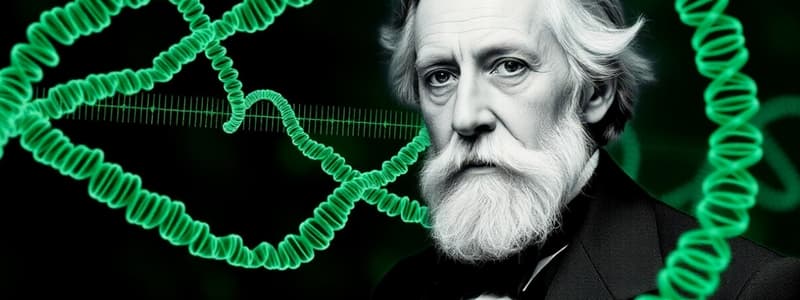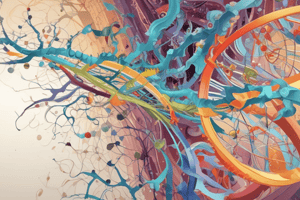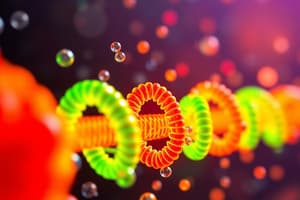Podcast
Questions and Answers
What was the primary focus of Frederick Sanger's initial research?
What was the primary focus of Frederick Sanger's initial research?
- Innovative methodologies in biology
- The chemical structure of DNA
- The amino acid sequences in proteins
- The protein insulin (correct)
Which contribution did Frederick Sanger receive the Nobel Prize in Chemistry for?
Which contribution did Frederick Sanger receive the Nobel Prize in Chemistry for?
- Developing DNA sequencing technologies
- Creating standardized laboratory procedures
- Innovating biochemistry teaching methods
- Determining the amino acid sequence in proteins (correct)
How did Sanger's methods for sequencing proteins work?
How did Sanger's methods for sequencing proteins work?
- Utilizing mass spectrometry for sequencing
- Through progressively breaking down proteins into smaller units (correct)
- By using X-ray crystallography to analyze structures
- Applying nuclear magnetic resonance techniques
What aspect of Sanger's work had a lasting impact on the field of biochemistry?
What aspect of Sanger's work had a lasting impact on the field of biochemistry?
In what other area did Sanger extend his research beyond insulin?
In what other area did Sanger extend his research beyond insulin?
Flashcards
Insulin: Sanger's Early Focus
Insulin: Sanger's Early Focus
Sanger's early research focused on understanding the structure and function of insulin, a crucial hormone, which laid the groundwork for his future groundbreaking contributions to biochemistry.
Protein Sequencing Technique
Protein Sequencing Technique
Sanger's innovative techniques involved breaking down proteins into smaller units to identify their amino acid sequence, creating a map of the protein's structure.
1958 Nobel Prize in Chemistry
1958 Nobel Prize in Chemistry
Sanger's groundbreaking work earned him the 1958 Nobel Prize in Chemistry, recognizing his pioneering contributions to understanding protein structure and function.
Sanger's Contribution to DNA Sequencing
Sanger's Contribution to DNA Sequencing
Signup and view all the flashcards
Sanger's Impact on Science
Sanger's Impact on Science
Signup and view all the flashcards
Study Notes
Early Life and Education
- Frederick Sanger was born in 1918 in Rendcombe, Gloucestershire, England.
- He showed an early aptitude for science and chemistry.
- He studied at the University of Cambridge, earning a degree in natural sciences.
- His time at Cambridge included significant academic achievements.
Early Career and Research
- Sanger's initial research focused on the protein insulin.
- He sought to understand insulin's chemical structure and function.
- His early work formed the basis for his later groundbreaking contributions.
- He developed innovative techniques for determining the amino acid sequences in proteins.
Deciphering Protein Structures
- Sanger pioneered techniques for sequencing proteins, particularly insulin.
- His methods involved progressively breaking down proteins into smaller units to determine amino acid order.
- These techniques became standard and fundamental for protein analysis.
- Sanger used chemical methods and developed practical techniques.
Nobel Prize in Chemistry
- Sanger received the Nobel Prize in Chemistry in 1958 for determining amino acid sequences in proteins.
- This prize recognized his pioneering work on protein sequencing, specifically of insulin.
- His achievements highlighted the significance of his contributions to biochemistry.
Other Discoveries
- Sanger's research extended beyond insulin to other molecules.
- He made significant contributions to DNA sequencing.
- With collaborators, he developed the first DNA sequencing methodologies.
- His DNA sequencing contributions were fundamental and influential.
Later Career and Legacy
- Sanger's career involved ongoing innovation and adapting to new challenges.
- He refined his methods and explored new biological systems throughout his career.
- Sanger's work significantly impacted many scientists and researchers.
- He significantly advanced the understanding of fundamental biological principles.
- He mentored and taught many students throughout his career.
Impact and Influence
- Sanger's groundbreaking work opened new avenues for biochemistry research.
- His discoveries facilitated advancements in medicine, biotechnology, and other fields.
- He played a significant role in the development of biological sciences.
- Sanger's legacy continues to inspire scientists tackling complex biological challenges.
- His methods established a framework for further sequencing and protein structure investigations.
Personal Life
- Sanger was married and had children.
- Details about his personal life remain limited.
- Personal details were not widely publicized or central to his professional image.
Death
- Sanger passed away in 2013.
Summary of his impact
- Sanger made an enduring mark on biochemistry and biology.
- His methods were revolutionary and laid the foundation for future discoveries.
- His contributions were vital for understanding and investigating proteins and other molecules.
- His influence extended to inspiring generations of scientists and shaping research directions.
Studying That Suits You
Use AI to generate personalized quizzes and flashcards to suit your learning preferences.




